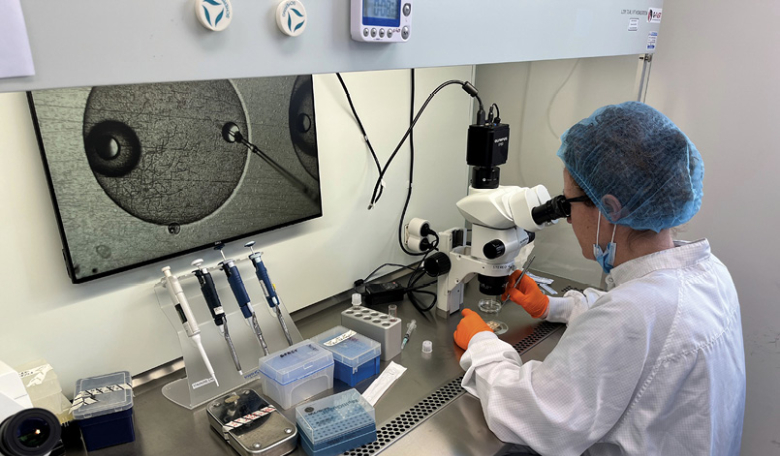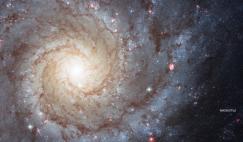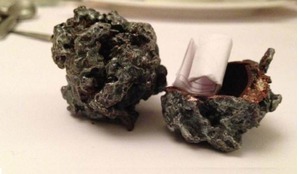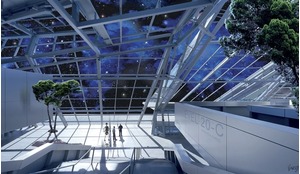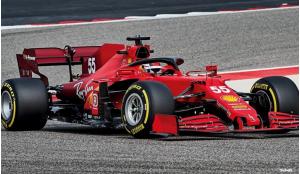Humanity stands on the brink of a new era in space exploration, with plans for human settlements on the Moon, in Earth orbit, and eventually even Mars. But as we push further into the cosmos, one fundamental question remains: can humans successfully reproduce beyond Earth? The ability to conceive and the healthy development of embryos in space are some of the most critical challenges facing future spacefarers, yet they remain largely uncharted territory. Among the pioneers tackling this complex issue is SpaceBorn United, a Netherlands-based company leading early research into space procreation. In this article, CEO Dr Egbert Edelbroek shares insights into the groundbreaking journey his company – alongside international partners – is undertaking to understand the biological and technological requirements for human reproduction in space. Their work not only lays the foundation for future space colonisation but also has the potential to revolutionise fertility treatments and reproductive science here on Earth.
For humanity to truly settle beyond Earth, the ability to reproduce off-world is essential. Without it, long-term human habitation on the Moon, Mars, or beyond will remain impossible. SpaceBorn United is at the forefront of this challenge, researching the conditions necessary for mammalian and human reproduction in space. Work involves designing mission concepts, developing a step-by-step programme and creating the biomedical equipment required to make space reproduction viable.
Advancing reproductive technology
Our first prototype is now ready for hardware validation in space and has been successfully integrated as a payload
The overarching goal is to enable different stages of human reproduction in space, paving the way for independent human settlements beyond Earth. However, the benefits of this research extend beyond space exploration. The same technology that facilitates safe reproduction in space also contributes to advancements in fertility treatments on Earth. In particular, this work is expected to improve in vitro fertilisation (IVF) success rates and enhance early embryo development.
Minilab for space IVF
At the heart of SpaceBorn’s research is the ARTIS (Assisted Reproductive Technology in Space) programme, which includes both IVF-in-space technology and the initial missions. During a six-day ARTIS mission female reproductive cells will be fertilised in space under artificial Earth-like gravity. After five to six days of development, the embryos will be cryogenically frozen and returned to Earth for examination. The first validation missions will use mouse cells, with the goal of ensuring that the resulting embryos are healthy enough to be placed in a natural womb for pregnancy and birth on Earth.
Future ARTIS missions will progress toward eventually using human reproductive cells (sperm and oocytes). One of the key scientific goals is to determine the minimum gravity level required for healthy embryo development, which will be achieved through partial gravity research. This also reveals if Martian gravity will be sufficient.
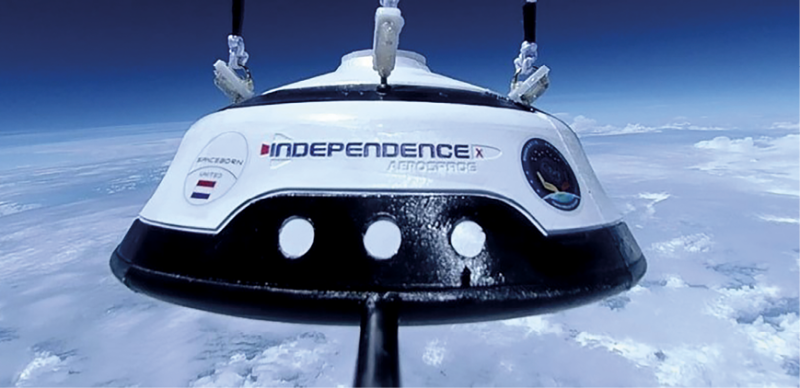 Independence-XAerospace's Microgravity Experiment Re-entry Capsule (MERCAP) is there-entry vehicle with onboard support system toSpaceBorn's unmannedorbital laboratory.
Independence-XAerospace's Microgravity Experiment Re-entry Capsule (MERCAP) is there-entry vehicle with onboard support system toSpaceBorn's unmannedorbital laboratory.
Maturing the ARTIS Minilab
In addition to technical and scientific advancements, we are developing a multi-decade research roadmap covering all stages of reproduction
As SpaceBorn continues to refine its minilab and mission programme, its first prototype is now ready for hardware validation in space and has been successfully integrated as a payload. Subsequent missions will include mammalian bio-samples to further advance the research.
This prototype ARTIS minilab features a functioning life support system, a microfluidic disc with a micropump, micro-cameras and an array of sensors. These sensors will capture data on the lab’s subsystems and flight characteristics, providing critical insights for future missions.
While awaiting upcoming hardware validation in space, the team is enhancing the minilab’s subsystems – particularly the microfluidic system, which is crucial for conception and early embryo development. Researchers are testing different disc configurations and bio-compatible materials to optimise performance.
Evolving the ARTIS programme
As ground-based experiments have progressed, SpaceBorn’s team has identified a way to accelerate the research. Initially, the plan was to conduct experiments with the fully developed ARTIS minilab inside the European Space Agency’s (ESA) Random Positioning Machine (RPM) to simulate partial gravity.
However, the team realised that crucial data could be gathered much sooner through a simplified experiment design using a less mature prototype. This new approach will not only provide vital scientific insights but also serve as an important validation for the business case. Work is now underway to define and prepare these experiments and the necessary hardware.
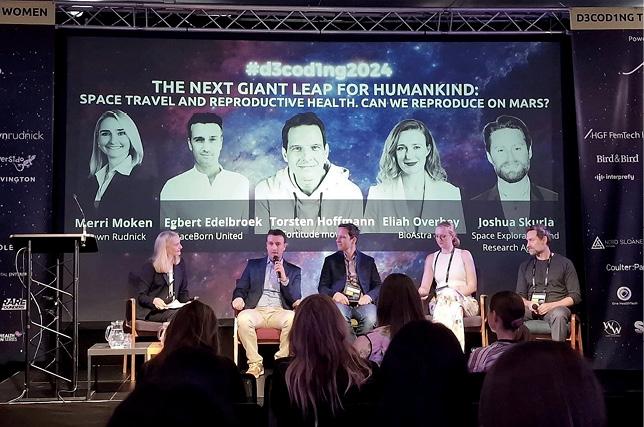 Panel discussion on space travel and reproductive health at 'Decoding the Future of Women' conference in London, June 2024.
Panel discussion on space travel and reproductive health at 'Decoding the Future of Women' conference in London, June 2024.
Ethical considerations
Given the nature of the research, ethical approval is a fundamental step in the process. SpaceBorn successfully secured approval from the Ethical Committee at Ghent University, allowing ground-based experiments at Ghent University Hospital's IVF Lab to begin. This milestone is also facilitating the approval process for using mouse embryos in the ARTIS minilab during SpaceBorn’s second space mission, scheduled for late 2025 from India.
The same technology that facilitates safe reproduction in space also contributes to advancements in fertility treatments on Earth
Ethics remains a key consideration in discussions with advisors, suppliers and investors. Recognising this, SpaceBorn has always maintained strong ethics expertise within its team and, as the team grows, so too does its commitment to ethical oversight, which will be further supported by the SpaceBorn United Ethics Expert Panel. This panel includes experts such as Alires Almon, Dr Peter-Paul Verbeek, Dr Vasiliki Rahimzadeh and Dr Victor Cole, who will all contribute to the company’s space reproduction symposia.
Validating experiment results
To prepare for ARTIS missions, SpaceBorn is testing the resilience of reproductive cells under spaceflight conditions. When oocytes are launched into low Earth orbit (LEO) for fertilisation, they experience approximately 5G of force for around eight minutes.
Initial tests, conducted with partners at NASA GeneLab and Ghent IVF laboratory, exposed oocytes to hyper gravity conditions in a centrifuge – demonstrating that, even at 9G, there were no negative effects. Further tests are planned to confirm these findings.
Another critical validation step involves assessing the materials used in the microfluidic system. Even certified bio-compatible materials can sometimes prove too toxic for oocytes and embryos.
SpaceBorn is working with specialists to optimise material selection, ensuring the best possible environment for embryonic development. Additionally, improvements are being made to the minilab’s gas-exchange membranes to prevent excessive evaporation of the growth medium. Future refinements will focus on optimising the sensor package for real-time analysis during missions.
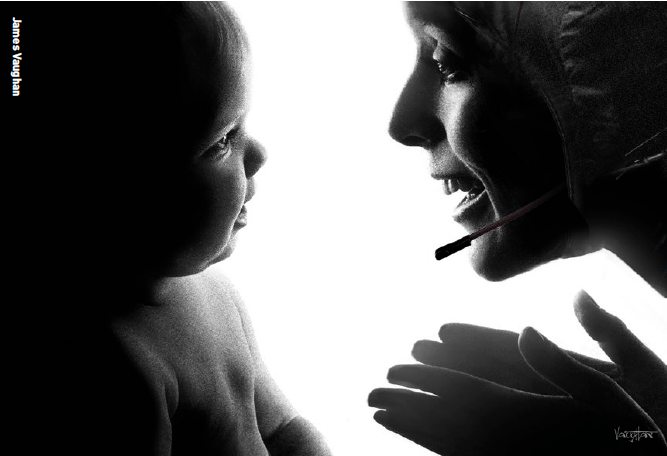 An imaginary interaction between a spaceborn child and its mother in the austere, technology environment of space.
An imaginary interaction between a spaceborn child and its mother in the austere, technology environment of space.
Expanding partnerships
Ethics remains a key consideration in discussions with advisors, suppliers and investors
As SpaceBorn advances along its research roadmap, the demand for specialised expertise continues to grow and we have recently welcomed new team members, investors and partners, including Ghent University (Belgium), IMEC and Siderius Space (Italy). SpaceBorn has been working for a number of years with Malaysia-based Independence-X and discussions with additional research groups and companies are ongoing.
SpaceBorn is also honoured to have prominent international experts such as Rick Tumlinson (a pioneering space entrepreneur and advocate for frontier expansion) and Prof Chris Mason (a specialist in genetics and spaceflight) join its advisory board.
In addition to technical and scientific advancements, SpaceBorn is developing a multi-decade research roadmap covering all stages of reproduction – both through assisted reproductive technologies and potential natural reproduction in space. This effort includes a symposium series, bringing together leading experts across multiple disciplines, including biomedicine, space technology, ethics, law, geopolitics and space business.
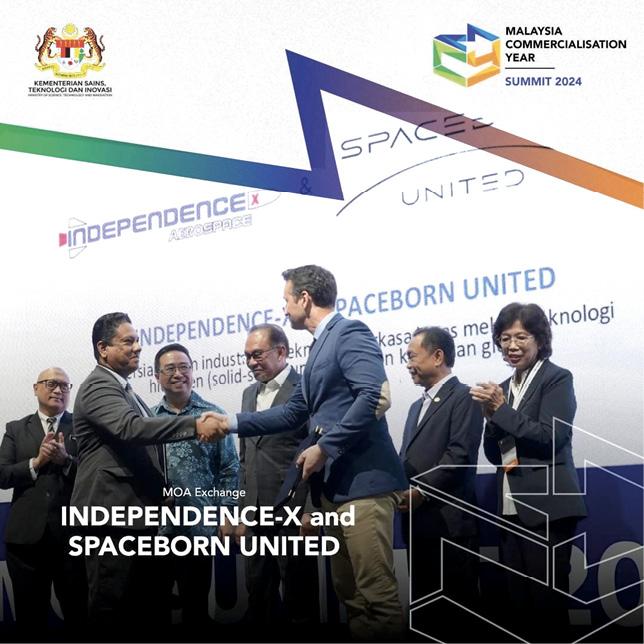 Malaysian Prime Minister YAB Dato Seri Anwar Ibrahim and the Minister of Science and Innovation celebrate the extended collaboration between SpaceBorn United and Independence-X Aerospace in 2024.
Malaysian Prime Minister YAB Dato Seri Anwar Ibrahim and the Minister of Science and Innovation celebrate the extended collaboration between SpaceBorn United and Independence-X Aerospace in 2024.
Enriching the future
Everyone at SpaceBorn United is driven by a vision of a thriving, multi-planetary human civilization - while also improving life on Earth. Throughout history, nature has inspired exploration, leading to groundbreaking innovations that benefit all of humanity and space exploration is no different.
By venturing into the cosmos, we expand scientific knowledge, test the limits of human resilience, and unlock new opportunities for adaptation in unfamiliar environments. These environments – defined by differences in gravity, atmosphere, and radiation – will not only challenge human biology but also reveal new potential for other species we bring along.
Through this research, SpaceBorn is not just advancing human reproduction in space; it is contributing to the broader scientific understanding of life’s adaptability and biodiversity, paving the way for an exciting future among the stars.
About the author
Dr Egbert Edelbroek is Founder and CEO of SpaceBorn United, a research and mission design company that researches and enables the conditions for human reproduction in space, while improving IVF on Earth. Egbert is passionate about accelerating space life science research, helping humanity beyond the next frontier by becoming a multi-planetary species. He earned his PhD in Courage Development in Organisations, connecting the domains of Biology, Neurology and Psychology. He learned that he enjoys innovating and exploring boundaries by connecting domains that usually remain separated.





